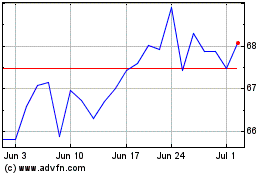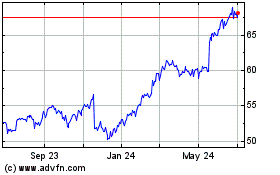Worker Strikes Against Wal-Mart in 2013 Were Lawful, NLRB Judge Says -- Update
January 21 2016 - 9:50PM
Dow Jones News
By Melanie Trottman
WASHINGTON-- Wal-Mart Stores Inc. violated federal law for
disciplining or firing several employees who participated in
strikes against the retailer, a judge for the National Labor
Relations Board said in a ruling issued Thursday.
The strikes in May and June of 2013 were protected under the
National Labor Relations Act, Judge Geoffrey Carter said in his
decision. The Bentonville, Ark., retailer has said it was within
its rights to discipline the workers for actions that it has called
illegal, intermittent work stoppages.
"We disagree with the administrative law judge's recommended
findings, and we will pursue all of our options to defend the
company because we believe our actions were legal and justified,"
said Wal-Mart spokesman Kory Lundberg. "We are focused on providing
our hardworking associates more opportunity for success and career
growth by raising wages, providing new training, education and
expanded benefit options," Mr. Lundberg added.
The strikes at Wal-Mart--along with similar walkouts at other
companies--were guided by advocacy groups that organize over the
Internet and specialize in sporadic, short-term protests and
social-media campaigns to make their points.
Labor lawyers have said it was unclear whether those actions are
covered by the 1935 National Labor Relations Act. The outcome of
the case has been viewed as having potentially broad implications
for companies confronting the new wave of nonunion protesters
employing the shorter strikes.
In his ruling, the judge said the Wal-Mart strikes in question
weren't "brief." He referred to them as the "Ride for Respect"
because most of the strikers rode buses to the company's
headquarters to protest during the annual shareholders meeting.
Mr. Carter said that although those actions were part of a
recurring set of strikes that the worker-advocacy group OUR Walmart
coordinated to draw attention to company working conditions, "the
similarities to unprotected intermittent work stoppages end
there."
"Specifically, the Ride for Respect strike was not a brief
strike that enabled associates to minimize the risks of being on
strike, nor was it scheduled close in time with a group of other
strikes, such that the strikes could be viewed as intermittent,"
Mr. Carter said.
In a filing Wal-Mart made in early 2014 to respond to the
complaint the labor agency brought against the company, the
retailer argued the job actions were hard to distinguish from
absenteeism and that it was defending its legitimate business
interests when it warned strikers it would enforce its policies
about being away from work.
Mr. Carter said in his ruling Thursday that Wal-Mart had
"failed" to prove the strikes were intermittent work stoppages
unprotected by law.
The judge's decision may not be the final one at the NLRB.
Wal-Mart could appeal to the agency's board. The NLRB resolves
workplace disputes and oversees union-organizing elections in the
private sector.
Sarah Nassauer contributed to this article.
Write to Melanie Trottman at melanie.trottman@wsj.com
(END) Dow Jones Newswires
January 21, 2016 21:35 ET (02:35 GMT)
Copyright (c) 2016 Dow Jones & Company, Inc.
Walmart (NYSE:WMT)
Historical Stock Chart
From Mar 2024 to Apr 2024

Walmart (NYSE:WMT)
Historical Stock Chart
From Apr 2023 to Apr 2024
